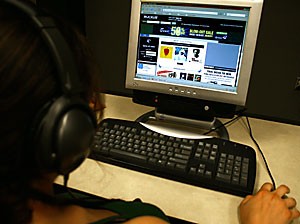Ruckus, a free, legal file-sharing program pioneered by the Office of Student Computing Resources, launches today, offering thousands of UA students a means to download their favorite songs without the threat of jail time.
Songs downloaded from Ruckus will work only on computers with a Windows operating system. They can’t be transported to mobile devices like Macintosh’s iPod, said OSCR project manager Patti van Leer.
The songs are also encrypted to expire when the user is no longer a UA student.
An ad-supported program, Ruckus has a library of more than three million songs and videos available for any student with a valid UA e-mail address, van Leer said.
Ruckus is part of an agreement between OSCR and the Associated Students of the University of Arizona, she said.
According to its Web site, Ruckus has a continuously expanding library of free, legal, safe music downloads. Students can browse and download at their leisure without worrying about legal consequences, as information on copyright and peer-to-peer file sharing is readily available, van Leer said.
After students register at Ruckus’ Web site, http://ruckus.arizona.edu, they can download their choice of songs to a Ruckus Media Player, which saves the songs in a personal library that can be shared with friends on the same network.
“”The real impetus for bringing Ruckus on campus is to at least mitigate the problem of illegal file sharing,”” van Leer said.
The UA has
The real impetus for bringing Ruckus on campus is to at least mitigate the problem of illegal file sharing.
-Patti van Leer,
OSCR project manager
had problems with students, especially those living in residence halls, committing copyright infringement. In the last four years, the UA has had three students get “” ‘take down’ notices,”” van Leer said.
The Recording Industry Association of America sent more than 2,400 pre-litigation letters to students at 58 colleges in August, according to U.S. News & World Report.
“”It can be very, very serious,”” van Leer said. “”We want to give (students) another avenue to have free, totally legal, downloadable music.””
David Rosenbaum, a biology freshman, said he is excited for Ruckus.
“”That would be awesome if I could listen to music while doing homework,”” Rosenbaum said, adding that currently he brings his own CDs to play on computers in the Integrated Learning Center while studying.
Rosenbaum said that he has downloaded music using LimeWire, an illegal file-sharing program, and that he will now forego it in favor of Ruckus.
Some UA students believe the program won’t catch on.
“”I don’t think it’s something I would use,”” said Ellen Fischler, a journalism junior and OSCR multimedia consultant. “”You can listen to songs, but you can’t do anything with them. You can’t burn them on a CD or an iPod.””
A semester-long trial of Ruckus at American University in Washington D.C. in 2005 resulted in nearly half of the students saying they never used Ruckus, according to Ars Technica, a PC-enthusiast Web site.
“”When you graduate, it’s gone,”” Fischler said. “”There are much more lasting ways of getting songs that are legal.””









